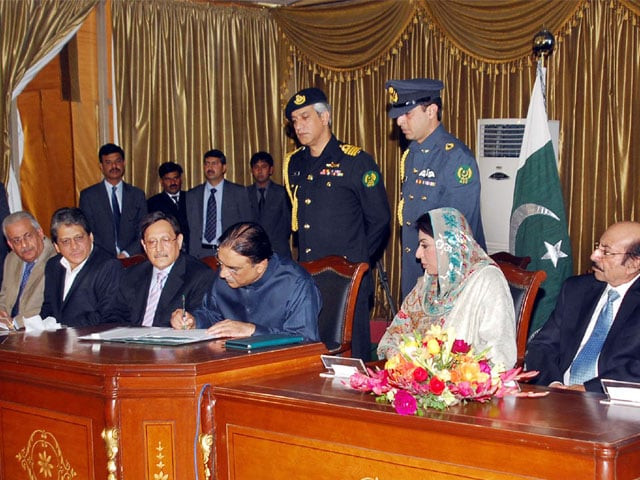New Year gift of democracy: Zardari ratifies 19th Amendment
Fresh legislation made in the spirit of consensus as seen during the framing of the 1973 constitution.

New Year gift of democracy: Zardari ratifies 19th Amendment
President Asif Ali Zardari signed the 19th constitutional amendment into law on Saturday, calling it a constitutional milestone for the country and a testament to the maturity of its signatory parties.
Addressing a gathering after signing the bill, Zardari said the legislation – which lays down a new system for appointment of superior court judges – was “a New Year’s gift of democracy” for the nation since it was aimed at eliminating a potential source of discord between the judiciary and parliament.
He said the new law proved that history is “made through political foresight” – referring to the amendment bill’s unanimous approval by the Senate and its two-thirds majority vote in the National Assembly.
The president also underscored the need for consensus across the political spectrum on all laws. “Amendments that are bulldozed through parliament rarely last long but those brought about by consensus usually withstand the vicissitudes of time and political wrangling,” the president was quoted by his spokesperson Farhatullah Babar as saying. Both the 18th and 19th amendments were passed with the same spirit of national consensus that was demonstrated by political parties in adopting the 1973 Constitution under the leadership of Zulfikar Ali Bhutto, he said. Zardari brushed aside rumours of an impending clash between institutions, blaming “political actors” for whipping up negative sentiments and vowing that such efforts were bound to fail.
Babar quoted the president as saying that the 18th and 19th amendments had undone changes made in the 1973 Constitution by military dictator General Ziaul Haq – and fulfilled one of the missions of Benazir Bhutto.
Speaking on the occasion, Senator Raza Rabbani heaped praise on the president for voluntarily handing over his powers to parliament and bucking the trend followed by successive holders of the president’s office. Rabbani described the adoption of the 19th amendment by parliament as a historical move and a triumph for parliamentary democracy.
Under the new law, the number of senior judges as judicial commission members has been raised to four, while the number of parliamentary committee members for the appointment of the chief election commissioner has been increased to 12.
The chief justice of the Supreme Court will make recommendations for the appointment of ad hoc judges in the superior courts in consultation with the judicial commission. In case of the dissolution of the National Assembly, members of the parliamentary committee will only be from the Senate. The amendment also permits sanctioning of administrative and financial expenses of the Islamabad High Court. It also makes it incumbent for bar council members to have at least 15 years of experience for appointment to the judicial commission.
The signing ceremony, which was held at the Bilawal House, was attended by Senate Chairman Farooq H Naek, National Assembly Speaker Dr Fehmida Mirza, Deputy Speaker Faisal Karim Kundi, Parliamentary Committee on Constitutional Reforms chairman Mian Raza Rabbani, Sindh Governor Dr Ishratul Ibad and Chief Minister Syed Qaim Ali Shah, Law and Parliamentary Affairs Minister Babar Awan, Leader of the House in Senate Nayyar Hussein Bokhari and Sindh Assembly Speaker Nisar Khuhro.
Published in The Express Tribune, January 2nd, 2011.



















COMMENTS
Comments are moderated and generally will be posted if they are on-topic and not abusive.
For more information, please see our Comments FAQ